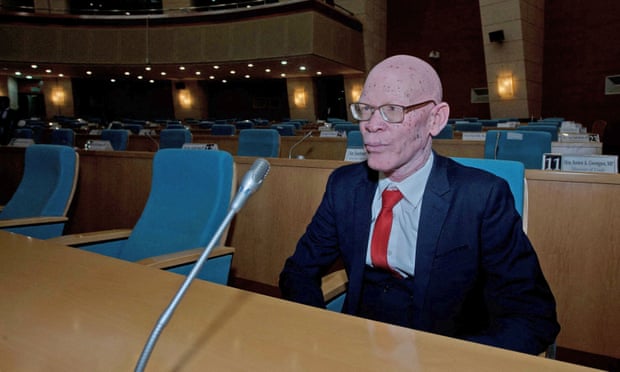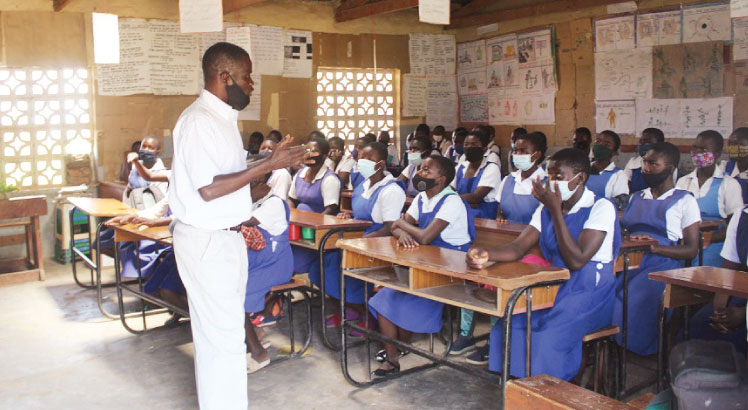Overstone Kondowe makes history
Malawi Parliament on Monday welcomed the country’s first ever elected person with albinism lawmaker when it reconvened after months of recess.
The presence of Overstone Kondowe in Malawi’s National Assembly is seen as a victory for people with albinism who have faced attacks in this southern African country since 2014.

Until last Thursday, when he took the oath of office in the capital, Lilongwe, Kondowe was President Lazarus Chakwera’s special adviser on persons with albinism and disabilities.
The move, following a by-election in Nkhotakota North East two weeks ago, comes amid continued attacks on people with albinism in Malawi.
Police records show that in the last four months, there were seven attacks on people with albinism, including killings, attempted abductions and physical violence. Separately, grave robbers have exhumed corpses to retrieve bodies of people with albinism.
Kondowe is also the former president of the Association of Persons with Albinism in Malawi or in short Apam.
He says that as a lawmaker in the National Assembly, he will pursue his fight against incidents targeting people with albinism.

“Let me assure them that I will do to the maximum of my potential to make sure that we should also have programmes, like what South Africa put in place,” says Kondowe.
“I am ready to do that. And I have also demonstrated my ability to do so when I was acting outside the system. Now, that I am at the centre of the system, I am sure change is coming, not tomorrow, but today.”
The statistics show that since 2014, more than 170 people with albinism have been attacked in Malawi because of false beliefs that concoctions mixed with their body parts bring luck and wealth.
To help stop the attacks, Malawian courts have imposed stiffer punishments on perpetrators.
For example, two weeks ago, the High Court in northern Malawi sentenced two men to life in prison with hard labour for killing a 54-year-old people with albinism.
Young Muhamba is the current president of the Apam. He says the election of Kondowe to Parliament sends a clear message that albinos are equal to other Malawians.
“We will be developing some bill to do with people with albinism,” he says.
“So, he will be the first voice there in parliament. He will be the first person to table the bill and to support it and also make others support it. So, he will be like our voice,” he adds.
Muhamba says the association is currently pushing the government to start implementing its programme of constructing houses for people with albinism as a security measure.
Federation of Disability Organisation acting executive director Simon Munde says he believes that Kondowe, a member of the ruling Malawi Congress Party, will also represent people with disabilities.
“We have faith in him,” he says. “The fact that he is quite an advocate, he has even done it when he was presidential adviser on disabilities, and we are not doubting in any way that that kind of spirit will continue with it as now he will be able to speak within the legislative assembly.”
He says the election of Kondowe to Parliament should send a message to other public or private institutions that disability does not equate to inability.
Overstone Kondowe is a 42-year-old son of a teacher, who grew up in a village without any help to ease the pain in his sun-sensitive skin or glasses to aid his poor eyesight.
He says albinism is so stigmatised and surrounded by superstition that people with the condition live at daily risk from both random attacks and from a murderous trade in body parts, which are used in witchcraft.
“Many children do not go to school,” he adds.
Ikponwosa Ero, a former UN adviser on albinism, said she was “elated” with Kondowe’s election, which she called a “giant step forward in the protection of human rights of people with albinism in Malawi and Africa as whole”.
“I congratulate Malawi for this step and for being one of the first to fund a national action plan on albinism. As that plan draws to a close, I urge the government to learn from that first edition and adopt a revised and extended plan since the attacks are still under-way in the country,” she says.
Despite struggling to see what was written on the blackboard, Kondowe worked his way through school and university to achieve high-level positions in both the government and in non-governmental organisations.
“I might be described as an overambitious person – that’s why I had the courage to contest,” Kondowe told The Guardian at his home in the capital, Lilongwe. “But the victory is a clear demonstration that people are changing their attitudes.”
Malawi and neighbouring Tanzania have a long history of people with albinism being killed for their body parts, which fetch high prices, as they are used in rituals and are believed to bring good luck.
According to senior Tanzanian police officers quoted in Through Albino Eyes, a 2009 report by the International Federation of Red Cross and Red Crescent Societies, a complete set of albinism body parts, including all four limbs, genitals, ears, tongue and nose, was fetching the equivalent of $75 000 (nearly K62 million). The attacks are more rampant during elections and people believe that politicians are involved.
Kondowe says: “There are a lot of beliefs and myths concerning people with albinism and we’re often viewed as second-class citizens or half-humans but because of the number of programmes that we’ve put in place, including civil education, this time around people accepted my candidature, not looking at albinism as a barrier but they just looked at the merits.
“To me, it’s a success story because I even won with a very big margin,” the new member of Parliament (MP) said.
While Tanzania had an MP with albinism in 2010 and Kenya had one in 2017, the two were nominated and did not win through the ballot box.
Kondowe plans to work at a legislation to protect all people with disability. “I understand that those who are not supporting the cause are doing so because of lack of awareness, so I will make sure I lobby more members of Parliament to have awareness as well as have the spirit to put us at the centre of development,” he says.
“I would make sure that the plans and budgets have something speaking to the needs and wants of persons with albinism and as well as those with disabilities.”
He hopes his election has set a precedent in a country where 134 636 people are living with albinism.
Charles Mailosi, 29, a teacher from Lilongwe who has albinism, said he was excited by Kondowe’s victory.
“I am just happy that Malawians have trusted him with the post. This is a powerful sign that Malawians are accepting [us],” he said. “It gives me courage that I can achieve greater things in life and that people can trust me.”
As for Kondowe, although attacks for body parts had been reduced, thanks to a handful of high-profile prosecutions, there was still a long way to go.
“As a country, we’ve conducted six investigations and these investigations have failed to nail down the market.
“I can say that we’re still on the right track because we have not given up but still continue with the investigations. It’s a criminal syndicate and it’s a hidden market and is difficult to track.
“We need more expertise, time and support from communities and investigators to track,” Kondowe added. “There is going to be a time that we’re going to make a breakthrough.”





